Contents of this chapter
2 Denominations
3 The Bible’s Bookends
4 That they may all be one
5 The Bible is the Inerrant Word of God
6 The Logos and the rhema
7 It is written
8 Who are the saints and apostles?
9 Jesus’ teachings do not need modernising
1 Introduction
The little, black, leather bound book had travelled with me for years as I hitched lifts from town to town, up and down the east coast of Australia, but this was the first time I had actually tried to read it. The book had been a gift from my parents for my 10th birthday. It had gold edged, delicate rice paper pages and I’d always loved the way it felt in my hands.
Although it had spent many years at the bottom of my backpack, it was still in its original box, nestled in a custom made green velvet pouch. I treasured this beautifully made book as a very familiar, sentimental, aesthetic possession, but just what all the words meant had always been a mystery. When I actually began to read it in 1971 I made a wonderful discovery, God is Love (1 John 4).
A small library of resource material had always accompanied me during the days of my long pilgrimage as a hippie seeking enlightenment. Other books came and went, and although the little black book always remained, I had never really looked into The Bible.
I was sitting in an old timber shack built for banana cutters in the hills behind Burringbar, northern New South Wales. I’d been living a very simple life without power, sewerage or running water. The farmer who owned the land where I lived had agreed to rent me his old, abandoned house for $1 a year, and I was determined to use my time discovering whether there was a God I could communicate with. If such a being existed I was intent on identifying just who or what it was.

My school was situated at the southern approach to the Sydney Harbour Bridge
Born and raised in Sydney, I had spent a number of years in the late 60s looking into New Age precepts and studying Theosophy and the teachings of Krishnamurti, before moving to a commune near Kuranda, far north Queensland in 1970. The commune was situated on the banks of the picturesque Clohesy River, just west of Cairns. The founder, whose name was Jan, had moved to Queensland from Germany, having been inspired by a vision of establishing a centre for spiritual growth.
 Krishnamurti
Krishnamurti
After arriving on the other side of the world, Jan bought two parcels of land near Cairns and began to develop the Kuranda site. He established gardens and built a large, galvanised iron machinery shed that he converted into quarters before inviting people to join his little isolated community. His goal was to establish a base where he could guide searchers in the way of his master. He believed this woman had ascended from a similar community in Spain many centuries before. He told us she was now, through him, gathering followers and would guide suitable candidates towards becoming enlightened beings, ready for ascension to a higher plain. Jan’s teachings were based on the Oahspe, a book its supporters claimed was produced by automatic writing in 1882. For many months I literally sat at his feet as he taught us his beliefs.
Despite its idyllic setting, the Clohesy community disintegrated, after a number of factions developed. Eventually, following a serious conflict concerning the rigid and extreme philosophy of the founder, the majority of members moved to another property near Barron Falls.

Barron Falls
The founder had definite ideals in mind when he bought the land and set up the commune and the departing faction had come to realise that these ideals were not in line with their own aspirations. I, too had gradually become disillusioned with the founder’s philosophy and not long after this split I decided to move on.
Following a brief stay in Sydney, I moved into that old shack in the lush, green valley about three quarters of the way from Cairns to Sydney and just west of the little village of Burringbar. When I started reading The Bible I was living there alone. After my year on the commune and earlier experiences in a number of group houses, I decided solitude would be more conducive to my search for enlightenment.

Burringbar
To enable me to continue my studies I had extended my small library of “spiritual” books, which now included The Oahspe, The Bhagavad Gita, The Autobiography of a Yogi, Zen Flesh Zen Bones, a book about the Findhorn community in Scotland and another on Sri Aurobindo’s teachings, The Imitation of Christ and the little Holy Bible I had kept from my childhood. It was as I read The Bible, with the help of a newly acquired book called The New Life, that I realised that Jesus is God and that God is Love.
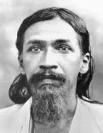 Sri Aurobindo
Sri Aurobindo
When I look back on that time, I realise “the hand of God” was guiding me on the day I entered the local Op’ shop. I paid 10 cents for 19th century writer, Andrew Murray’s battered, old book, aptly titled The New Life. Hidden amongst a pile of old and discarded books, looking very much the worse for wear, the title attracted my attention. I was searching for a “New Life,” one that was in balance with the cosmos; little did I dream this tatty old book would actually be the means by which I would discover the God who created the universe and the Lord Jesus Christ who gives eternal life.
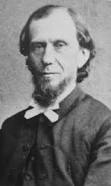
Andrew Murray
My life since those days has changed dramatically. Knowing and serving God has remained my first priority, but day to day living has naturally continued to present many challenges. However, life is never the same when you realise that faith in Jesus is about Truth, not simply the opinions of men. Walking with Jesus is an entirely different life to the one I had been leading. As a hippie I had opted out of the modern world. I was unimpressed with modern culture and saddened by society’s attempts at creating world peace. Having denounced possessions, status and tradition, I had been attempting to walk lightly through the world of material illusions.
When I met Jesus I came to understand that I was no different to the people I thought were uninformed and unloving. I realised I was also unloving, egotistical and self centred. I had played at being spiritual by seeking out the deeper meaning of the universe, assuming a kind of spiritual one-upmanship through my “superior” knowledge. I had certainly never considered Christians could hold any spiritual knowledge, in my eyes they were too rigid, too old fashioned and did not seem to understand deeper truths and esoteric knowledge.
Gradually, as I learned to listen to Jesus, to depend on Him and to be guided by Him, the Lord helped me to let go of my pompous presumptions and to overcome many other obstacles to our journey together. In the early 1980s I went back to high school and then to university and after a very satisfying career as a primary school teacher, I retired in 2000. I have followed Jesus from that day in 1971 to this. During those 40 plus years He has been my constant companion and it has been His Word and His Spirit that have lovingly guided me.
2 Denominations
When I was first drawn to Jesus, one of the most confusing issues for me was the number of different Christian denominations. Before deciding to commit myself to a deeper relationship with Jesus, I had been on a solo journey of discovery, but after meeting Him through the pages of The Bible, my first impulse was to join a convent. Why a convent? Over the years I had watched as a number of my friends joined ashrams or become Buddhist nuns or monks and went off to live in temples. Joining a convent seemed the obvious thing to do if I was to pursue my new-found devotion to Jesus.
Realising I needed to find a convent to further this ambition, I hitched a ride to Murwillumbah, the closest major town to my little shack. I soon found the commanding building of the Sacred Heart Catholic Church.

Sacred Heart Church
Right next door to this impressive, red brick church was a very beautiful old weatherboard convent building, where the nuns were rather bemused by my appearance. These kindly sisters informed me that there was a little convent not far from my home back in Burringbar where the Sisters of St Joseph lived. They sent me off with some prayers to recite and suggested I go to the convent in Burringbar to learn more about becoming a Roman Catholic nun.
Eventually I decided to pay a visit on the local nuns and arranged a lift with the mailman for the 8 kilometre trip into Burringbar. To my surprise the convent had recently been closed. Instead of nuns I found two large lorries parked at the site and a number of hefty men, who were busily in the process of cutting the convent building in half. It was a rather unmistakeable door being shut in my face. I felt totally perplexed as I watched the busy workmen preparing to transport the convent to a new location in South Murwillumbah. They were about to cart away my only idea on how to follow my new Lord Jesus more closely. Throughout the following days I spent a great deal of time asking God to help me understand what I should do next.
Over the years since that day I have spent quite a lot of time asking God questions and thinking back on that episode. Although I grew up in a nominal Protestant home I had been fully prepared to enter a Catholic convent, if that was indeed what was required to learn more about being a follower of Jesus. In the early days of exploring the Christian faith I didn’t think much about the differences between the Roman Catholic Church and the Protestant denominations, although I did understand they were very different expressions of faith. Gradually I came to understand why so much conflict has surrounded these two very different approaches to the Christian life. Now, after 40 years of study and consideration, I feel I understand a little more about the chasm that exists between these two paths.
History reveals the Roman Catholic Church looks mostly to traditions that are constantly shaped by men, and I mean that literally, women appear to have little or no place in the core discussion. The Bible has a role in this institution, but it appears church tradition, scholarship, and the male hierarchy totally dominate the body of believers.
As a consequence of the Reformation, the Protestant Church seems to follow a more dynamic path, one that relies predominantly on the scriptures. The different denominations within its ranks seek to find guidance and appropriate responses to contemporary issues in the pages of The Bible.
It could be argued, that throughout history Protestantism has proven to be far more egalitarian than her Roman Catholic cousin. Anyone who knows the Lord Jesus Christ, is filled with His Spirit and can read a Bible has the right to an opinion, but, all doctrine must be based on God’s Word and not the changing opinions of human society. Sadly, over the centuries, many human traditions and rituals have grown up around a number of the Protestant churches as well, and history has shown some to be just as inflexible and top heavy as the Roman Catholic establishment.
In a Bible based community of believers, men and woman are equal (Gal 3:28). Jesus certainly treated women in the same way He treated men, revealing deep spiritual truths to them in a way the Jews of His day would have found challenging (John 4:4-26). Although in certain circumstances women may not teach men in the church (1 Tim 2:12-13), their contributions are equally respected. Women have always played an important role as followers of Jesus, they were last at the cross (Mat 27:55) and first at the tomb (Mark 16:1-6) of Christ.

©Providence Collection: Licensed from GoodSalt.com
A number of women accompanied Jesus and the apostles during their travels and at times supported them financially (Mark 15:41).
History also reveals a sad misuse of The Bible when we see how some of the letters of Paul have been used to keep women in the Body of Christ in a secondary role. Paul raises the issue of women speaking in the church in 1 Corinthians 14, however, he is no doubt addressing a specific situation in Corinth where women were disrupting the order of the service with their constant chatter. Earlier in this letter (1 Cor 11:5) he mentions women praying and prophesying in the church without censure, so we can assume that his purpose in chapter 14 is to restore order to the worship services.
It should also be noted that Paul was concerned that Christians should avoid even the appearance of evil (1 Thes 5:22) and consequently he often advised women to avoid infringing any cultural practices placed on women in the communities in which they lived. While men were directed to keep their head uncovered in prayer (1 Cor 11:4), women were advised to cover their heads (1 Cor 11:5). Both of these directives relate to specific cultural practices of the time, men uncovered their heads to show respect for God, whereas women who uncovered their heads in public were seen as sexually immoral.
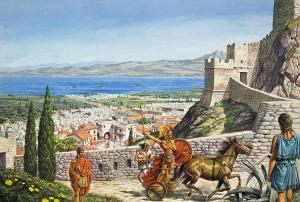 Roger Payne’s beautiful painting of Ancient Corinth
Roger Payne’s beautiful painting of Ancient Corinth
Women worked hard to help establish the early church and many were commended by Paul for their contributions (Rom 16:1-6, 12). In our modern world the role of women is an issue that can divide churches. Some might suggest that if I am to insist on following The Bible as my guide I must accept the narrow traditional view much of the church has presented concerning the subordination of women. However, my point is that I do not think the traditional view is necessarily the biblical view (Mat 15:6).
We can all discover for ourselves just what the scriptures say and that is the beauty of a Bible based community. My vision is one where every person who is a follower of Jesus is respected and accepted, while their respective contributions are valued. The early church grappled with this issue (1 Cor 12) and recognised individuals had differing gifts to offer the community of believers. Throughout the centuries, many Christian groups have attempted to create a unity within the diversity of individual believers in the local body of Christ, and I have no doubt that many in today’s world continue to do so. Denominations rise and fall but ultimately we are all members of one body and need to find the core beliefs that bind us. It is my contention that these beliefs must be exclusively based on God’s unique, personal revelation to humankind, The Bible.
3 The Bible’s Bookends
Over the years I have also come to realise that a great deal of disunity has been generated in traditional churches from doctrines surrounding what could be called The Bible’s Bookends, that is, the books of Genesis and Revelation. It could quite legitimately be stated that these two books set the tone for the entire Bible and if we don’t treat these books correctly, we get the rest of God’s Word out of context. But for me, it is the vital understanding of our Father’s declaration that He is Love that is most at risk of being understated by a misunderstanding of these two important books of The Bible.
I am indebted to two fine Christian men for my sense of direction concerning these two books of The Bible. For a better understanding of Genesis I am confident in trusting Dr Carl Wieland and the other scientists at Creation Ministries International (CMI) creation.com as they seek to apply sound, rigorous science to our understanding of this challenging book. For insight into The Revelation I trust Dr Edward Fudge, who wrote the book, The Fire that Consumes. Sadly, I am not sure these two men would completely trust each other, and such division is the source of my tremendous sorrow concerning the body of Christ today.


Dr Edward Fudge & Dr Carl Wieland
♥♥♥
4 That they may all be one
Chapter 17 of John’s gospel has always been an important passage of scripture for me. There are two verses that particularly speak to me in this chapter, in these verses Jesus prays:
Neither for these only do I pray, but for them also that believe on me through their word; that they may all be one; even as thou, Father, art in me, and I in thee, that they also may be in us: that the world may believe that thou didst send me. (John 17:20-21)
In a very real sense, the great intercessory prayer the above verses are contained within, could be called the Lord’s Prayer, because it is the prayer Jesus prays just before His crucifixion.
Despite this powerful prayer, a large part of the contemporary institutional church continues in disunity. Some factions allow certain aspects of modern science to determine their understanding of the past (Genesis), while tradition, rather than scripture, defines beliefs concerning the future (Revelation). Neither of these extra biblical sources should come against the unity of the body of Christ, nor should they override the authority of The Bible. Jesus asked the Father to give us unity, not for our own peace of mind, but because He knew it would be the most powerful tool in showing the world the Truth. He wanted the world to know that the one true God, who is Love, sent His only begotten Son into the world to die for the sin of humanity.
5 The Bible is the Inerrant Word of God
After following Jesus, first as my guru, then as my friend, and finally as my Lord and Saviour, I realised I needed to change my attitude to The Bible. I met Jesus without knowing anyone else who followed Him and at first I had to depend entirely on Him to find my way. I soon began to meet some wonderful Christian people, but it was not long before I realised I needed an authority to turn to when things were not clear.
As I moved from one town to another, I went from a traditional Protestant group to a group that tended towards liberal theology, and then to one that was full blown charismatic. During this time I had numerous people’s ideas presented to me as “Christian Truth,” and before long I realised many of these ideas were in conflict.
It took me a number of years to sort through the many approaches to belief in Jesus Christ that I discovered in the variety of churches I attended. My first years of seeking to follow Jesus as part of a local Christian group were filled with confusion – everyone was so sure their path was the right path. Many questions arose for me during those early years. Were the core components of the Christian gospel that we find systematically recorded in The Bible (the Creation, the Fall, the Incarnation, the Atonement, and the Resurrection) merely mythological representations of an existential truth, or could they be taken at face value? Did God create the world and then come into that world as the man Jesus, who physically lived, died and rose again in a country called Israel, or was this fable and not history – an elaborate myth constructed by the faithful followers of a Jewish peasant?
Thankfully, God has made bountiful provision for us to find Him and understand His Truth. Modern theologians can play word games with the scriptures but the Holy Spirit did not reveal an existentialist truth to me. He revealed a man of history, a physical man who lived a perfect life, died an atoning death and rose again, so that He could relate to me and anyone else seeking to follow Him in a very personal way through His Holy Spirit.
After coming to an understanding of the world’s problem with sin, I also came to realise that Jesus is not the person we want Him to be, He is not an aesthetic, mystic, philosopher, sage or great teacher, He is the man revealed in The Bible, the Saviour of the world. Any other man is not the Jesus of The Bible and therefore is not God’s only begotten Son, who came into the world to deal with sin. I had followed the Cosmic Christ, the Mystic Christ and the Aquarian Christ but the Christ revealed in The Bible is God’s only Son, He does not need repackaging for the modern world.
The Bible is not simply a spiritual book that is limited to religious matters. The Bible records the history of the world. Jesus was born into world history, but He was not simply a man of His times, bound by the culture of 1st century Palestine. He spoke authoritatively about the beginning of the universe (Mat 19:4; Mark 10:6) and declared Himself a man come from heaven to the Earth (John 6:32, 38, 62) to outline God’s eternal Truth and give eternal life to all who believe on Him (John 6:40).
Jesus taught respect for the scriptures and often quoted them (Matthew 12:3, 5;19:4; 21:16, 42; 22:31; Mark 2:25; 12:10, 26; Luke 4:16; 6:3; 24:46, 47, John 6:45, 10:34, 35). During His ministry He instructed His disciples carefully so that they could teach and write about His Way, helping those who came centuries later to hear His voice and understand His intentions (John 17:6-8).
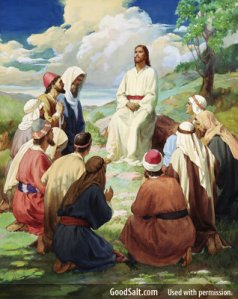
© Providence Collection/Licensed from GoodSalt.com
God worked patiently through the Holy Spirit to guide the recording and collation of the books of The Bible and many wonderful people gave their lives so that today, God’s Word has been translated into the languages spoken by 95 per cent of the world’s population. God has ensured the work of making access to His Word possible, for as many people as possible, goes on today. The Christian Bible is still the world’s number one best seller of all time (New York Times).
As Christian theologian and philosopher, Francis Schaeffer asserts in his book, The Great Evangelical Disaster, unless we accept The Bible’s version of Jesus we lose the balance of the Christian message – God is not simply love, He is also holy. Schaeffer also warns that the foundation upon which Christianity rests is being destroyed by a change in our attitude to the scriptures; he then describes just what that foundation is when he states:
It is that the infinite-personal God who exists has not been silent, but has spoken propositional truth in all that The Bible teaches-including what it teaches concerning history, concerning the cosmos, and in moral absolutes as well as what it teaches concerning religious subjects.(1)
Schaeffer is echoing the sentiments of Bible believing Christians from the beginning of the formation of the church. It is only in the past few centuries, since the introduction of higher criticism has so influenced the church, that attempts have been made to harmonise Genesis with the increasingly popular ideas of geologists promoting the notion of slow and gradual change and the concept that the past can be explained in terms of forces we observe in the present.
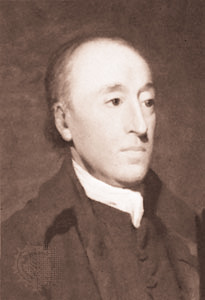 James Hutton
James Hutton
James Hutton (1726–1797), the Scottish physician and farmer, who is widely regarded as the father of modern geology, introduced the idea of uniformity towards the end of the 18th century. Following his lead Sir Charles Lyell, the British geologist and lawyer (1797–1875), confessed his intent to free science from Moses (see) when he proposed a great age for the earth.
For hundreds of years before liberal theology invaded the bureaucracies and seminaries of evangelical Protestantism, biblical commentaries clearly adhered to a plain reading approach to Genesis. Until the late 18th century, the prominent understanding of the age of the earth for the Christian world of Eastern and Western Europe and North America, was based on the biblical record and theologians had no difficulty understanding the overwhelmingly obvious meaning of Genesis. However, during the past two hundred years, many professing Christians have come to view The Bible as nothing more than a guide.
When I first began following Jesus I had never heard the word inerrant and it was many years before I grasped that what The Bible says, God said. Eventually, I came to understand the importance of accepting The Bible as the complete and final authority on Christian doctrine. As Paul writes:
All Scripture is breathed out by God and profitable for teaching, for reproof, for correction, and for training in righteousness, that the man of God may be competent, equipped for every good work. (2 Timothy 3:16-17)
And also:
For I would have you know, brothers, that the gospel that was preached by me is not man’s gospel. For I did not receive it from any man, nor was I taught it, but I received it through a revelation of Jesus Christ. (Galatians 1:11-12)
While Peter adds:
For we were not making up clever stories when we told you about the powerful coming of our Lord Jesus Christ. We saw His majestic splendour with our own eyes when He received honour and glory from God the Father. The voice from the majestic glory of God said to Him, “This is my dearly loved Son, who brings me great joy.” We ourselves heard that voice from heaven when we were with Him on the holy mountain. Because of that experience, we have even greater confidence in the message proclaimed by the prophets. You must pay close attention to what they wrote, for their words are like a lamp shining in a dark place—until the Day dawns, and Christ the Morning Star shines in your hearts. Above all, you must realize that no prophecy in Scripture ever came from the prophet’s own understanding, or from human initiative. No, those prophets were moved by the Holy Spirit, and they spoke from God. (2 Peter 1:16-21)
Once I took the step of accepting The Bible as God’s inerrant Word I found a new freedom, the freedom to trust God to unambiguously guide me. He had guided me unerringly to His Son through His Word, and now I realised He could guide me by His Word throughout my Christian walk. I had become like the people from Berea in Acts 17:11 (and many other brothers and sisters throughout history and the world today), I listened to anyone who claimed to follow Jesus, then checked their ideas against The Bible, God’s inerrant Word (see).
The Christian walk is not about intellectual ability, reading widely or extensive study; it’s about immersing oneself in the Word of God, while allowing the Holy Spirit, to be the guide. Other members of the body of believers may draw our attention to unfamiliar passages of the scriptures (and this may be through a book), but the final authority should always be God’s Word. It is over God’s inerrant Word that we can meet and exchange ideas.
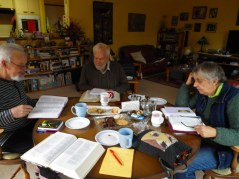 The church, the universal body of believers, can look to God’s inerrant Word and know that the words in The Bible can be taken at face value. If this were not the case there would be no way to know who Jesus is and what He believed and taught. There would be no way to be a Christian. Thankfully, our Lord has wisely and carefully provided The Bible so that Christians throughout history can come to the same core beliefs. One need only examine the writing of Christian authors from the beginning of the Church Age to find their work reflects the same set of core beliefs followers of Jesus hold today. This is because they also recognised The Bible as the final authority for their doctrine.
The church, the universal body of believers, can look to God’s inerrant Word and know that the words in The Bible can be taken at face value. If this were not the case there would be no way to know who Jesus is and what He believed and taught. There would be no way to be a Christian. Thankfully, our Lord has wisely and carefully provided The Bible so that Christians throughout history can come to the same core beliefs. One need only examine the writing of Christian authors from the beginning of the Church Age to find their work reflects the same set of core beliefs followers of Jesus hold today. This is because they also recognised The Bible as the final authority for their doctrine.
After accepting the inerrancy of God’s Word I realised there was one further step to be taken; the question of a method of interpreting the scriptures was also important. Throughout those early years I was exposed to the concept of hermeneutics, or the art and science of interpretation. The question of interpretation seemed extremely important to a person like me, who had cavalierly imposed all manner of allegorical interpretations on the “holy books” of the world.
Thankfully the scriptures give a clue as to how they should be approached. In Proverbs we find:
All the words of my mouth are just; there is nothing cunning or perverse in them. They are all plain to people with understanding, and straightforward to those with discernment. (Proverbs 8:8-9)
While Paul assured his readers:
We have renounced secretiveness and dishonesty, we do not use subtlety, nor handle the word of God deceitfully; but by expressing the truth we commend ourselves to every man’s conscience in the sight of God. (2 Corinthians 4:2)
These verses patently indicate a straightforward, plain reading approach is the best method of interpretation. After examining a number of alternatives, I eventually decided the method of exegesis that seemed the least likely to impose subjective interpretations on God’s Word, was the historical-grammatical method. Using this method the reader is encouraged to thoroughly investigate the text’s historical and grammatical context.
When one accepts the belief that the Father has given us a specific set of texts, collected together in one unique book, to communicate His Truth to His people, it is apparent one should make every effort to interpret these texts using the best possible method. What we need is a process where the principles and methods are employed in order to best derive the author’s intended meaning from the text (see). Higher or literary criticism refutes the concept of an inerrant Word from God. Thus, this method is not suitable for those who believe God has communicated to us through His inerrant Word.
Many people disparage the notion of regarding The Bible as God’s inerrant Word, but for me it is simply the sort of thing Jesus was talking about when He said:
…. Truly, I say to you, unless you turn and become like children, you will never enter the kingdom of heaven. (Mat 18:3)
I have had numerous discussions with people who question the possibility that God could provide a book that is totally without error or contradictions through human intermediaries, they view such a belief as infantile. For me, accepting this as one of God’s great, creative miracles was a step of faith that has proven to be invaluable. Numerous books have been written on the subject, but the bottom line is that God is able, and throughout the ages He found people who were willing to produce His Word. Since the canon was completed the battle continued as people all over the world worked tirelessly to copy and produce God’s Word for people everywhere. When we consider the suffering that has made it possible for us to read God’s Word today, John Wycliffe and William Tyndale come to mind, but these men are perhaps those we best remember.
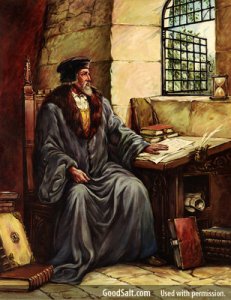
Wycliffe Translating the Bible
©Providence Collection: Licensed from GoodSalt.com
Many brothers and sisters throughout the church age have given their lives because they too understood the incalculable importance of The Bible to human life. It is God’s Word to us.
6 The Logos and the rhema
There is no doubt that God’s most wonderful miracle (apart from the very creation itself) was the virgin birth of His Son into the world He created by the power of His Word (Heb 11:3). John declared in his gospel that the Lord Jesus is the Living “Word,” using the Greek word logos to give Jesus this appellation.
λόγος
The Greek word logos, refers to an intelligent expression or word. Our English word “logic” comes from this Greek word. Thus, Jesus is the living, intelligent expression of the omnipotent, omnipresent, omniscient, Eternal Spirit – God the Father. The Lord Jesus Christ is therefore the source of all logic and reason; the source of true knowledge and wisdom.
As John writes:
In the beginning was the Word(logos), and the Word was with God, and the Word was God. (John 1:1)
In this opening verse of his gospel John introduces the pre-existent Christ, He who is the intelligent expression of the Living God. John is linking this verse to the very first verse of the Old Testament (OT) which says:
In the beginning God created the heavens and the Earth. (Genesis 1:1)
John is emphasising the fact that Jesus existed before the heavens and the Earth were created. John goes on to say:
All things were made by Him; and without Him was not anything made that hath been made. (John 1:3)
This verse reveals the fact that Jesus not only pre-existed the creation, it announces that it was indisputably through Him that the creation came into being.
In one of his letters John adds:
We proclaim to you the One who existed from the beginning, whom we have heard and seen. We saw Him with our own eyes and touched Him with our own hands. He is the Word(logos) of life. This One who is life itself was revealed to us, and we have seen Him. And now we testify and proclaim to you that He is the One who is eternal life. He was with the Father, and then He was revealed to us. (1 John 1:1-2)
Another of our Father’s great miracles was to give us His written Word, The Bible, which is often referred to as the Word of God or God’s Word. In The Bible the Greek word rhema is also translated into English as “word”. Rhema refers to that which is spoken by the living voice. Therefore the Logos, who is the Living Word, produced the rhema, the written Word of God. The Bible is God’s written Word – it is God’s direct communication to us in the same way spoken words communicate information to a listener. Thus, the Living Word gives us the words of life today when He speaks to us through the scriptures, the Word of God, The Bible.

We can understand more clearly the power of God’s Word by looking at a few scriptures. The writer to the Hebrews tells us:
By faith we understand that the present world was completed by the Word(rhema) of God, so that what is seen did not come into being out of things that are visible. (Heb 11:3)
God brought this present creation into existence out of nothing by His Word(rhema), through His Son, the Living Word(logos). After the Lord Jesus went to be with the Father He sent the Holy Spirit to accompany believers and to guide them (John 14:16). Through the Holy Spirit the Father speaks to people using His written Word(rhema), The Bible, to bring them into and grow a relationship with His Son, the Living Word(logos). And it is through a relationship with the Son that God is now bringing a new creation into existence (Gal 6:15), this new creation is the Body of Christ (1 Cor 12:27).
God used His own hand to write the Ten Commandments for Moses to convey to the Israelites (Exodus 31:18).
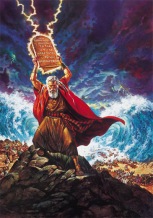 After this, Moses, and later the prophets, recorded God’s Words for the people of Israel; perhaps on papyrus carried with them from Egypt. For the new Body of Christ He was about to create, Jesus meticulously trained His apostles in preparation for the writing of the New Testament. These men, inspired by the Holy Spirit, recorded His Words(rhema).
After this, Moses, and later the prophets, recorded God’s Words for the people of Israel; perhaps on papyrus carried with them from Egypt. For the new Body of Christ He was about to create, Jesus meticulously trained His apostles in preparation for the writing of the New Testament. These men, inspired by the Holy Spirit, recorded His Words(rhema).
7 It is written
During His temptation Jesus quoted Deuteronomy 8:3 to Satan. He used the OT scriptures to combat Satan’s lies and declared that it is God’s word(rhema) that nourishes us. It can also be reasonably asserted that Jesus taught His followers to believe God’s Word was recorded by those God had chosen and enabled for the task. Jesus was quite explicit in describing the scriptures as coming from the mouth of God. As Matthew records:
But He answered and said, “It is written, Man shall not live by bread alone, but by every word(rhema) that proceedeth out of the mouth of God.”(Matthew 4:4)
God has not left us guessing about how we can know and obey His Son two thousand years after Jesus walked the streets of Jerusalem. He has deliberately provided believers with the words He wants us to follow by ensuring they were included in His Holy Bible. We can be assured that, like the Living Word, these words can be completely trusted. As John wrote:
For He(Jesus) is sent by God. He speaks God’s words(rhema), for God gives Him the Spirit without limit. The Father loves His Son and has put everything into His hands. And anyone who believes in God’s Son has eternal life. Anyone who doesn’t obey the Son will never experience eternal life but remains under God’s angry judgment.” (John 3:34-36)
The Father has not left His people guessing about how to obey the Son, He has communicated to His people through His written word and He reveals this word to His people through His Holy Spirit. In John’s gospel Jesus is recorded as saying:
The Spirit alone gives eternal life. Human effort accomplishes nothing. And the very words(rhema) I have spoken to you are spirit and life. But some of you do not believe Me.” (For Jesus knew from the beginning which ones didn’t believe, and He knew who would betray Him.) (John 6:63-64)
And also:
The one who rejects me and does not receive my words(rhema) has a judge; the word(logos) that I have spoken will judge him on the last day. For I have not spoken on my own authority, but the Father who sent me has himself given me a commandment – what to say and what to speak. And I know that His commandment is eternal life. What I say, therefore, I say as the Father has told me.” (John 12:48-50)
We will be judged by whether we have accepted Jesus as the Logos, the Living Word, who speaks the very words(rhema) of God.
Jesus also said:
For I have given them the words(rhema) that you gave me, and they have received them and have come to know in truth that I came from you; and they have believed that you sent me. (John 17:8)
Jesus obviously attributes great power to His words, they are spirit and life to those who listen to Him. He did not leave us guessing about what He may have said, He made thorough preparation for people to hear His words. Those who reject His words will be judged by those words when they are raised on the last day. Jesus took three years to ensure His words were passed on to His disciples and they in turn have passed them on to us.
One of the criteria for books to be included in the New Testament (NT) canon was that the authors must have known Christ personally, or have recorded the words of someone who knew Christ personally. The men Jesus judiciously chose, taught and continued to guide by His Holy Spirit after His ascension, were given the task of recording the NT scriptures. Granted the NT was not confirmed until the Council of Hippo in 393AD, but the Codex Vaticanus was created in 325 – 350AD from books that had been in use in the early church, virtually from the time they were written in the first century.
In a discussion I had with a Christian friend, who grew up in a traditional, church-going family, I discovered how far many traditional Christians have moved away from seeing The Bible in the way I have described above. In one of our exchanges he insisted that, “if our faith in Jesus is based on a God given canon which we can verify that God signed-off, then faith is not required. We have certainty. No questions remain.”
From my perspective, viewing The Bible as God’s inerrant Word does not remove a need for faith, far from it, faith is required to live in this world when we are no longer of this world (John 15:19). But certainty – absolutely – we have absolute certainty that the Jesus we meet in the pages of The Bible is exactly who He says He is and He will definitely do just what He says He will do. Until I met Jesus in the pages of The Bible he was whoever I wanted him to be, but it is through The Bible that the real Jesus reveals Himself and He has continued to reveal Himself and His Truth to me from those pages. I have no doubt that millions of Christian people from the very beginning of the Church Age have had exactly the same attitude to, and experience with, the Holy Bible and the Lord Jesus Christ.
In his writings, Paul used a particular phrase a number of times, he wrote, “I would not have you ignorant.” (Rom 1:13; 1 Cor 12:1; 2 Cor 1:8; 1 Thes 4:3). Paul made it clear that we should be informed concerning the things of God if we are to be followers of Jesus. The real question is, should we be informed by the changing opinions of men and women, or by the Word of God? Francis Schaeffer reminds us that the opinions and passing ideas of our present culture change, but The Bible is God’s timeless message to His people. Schaeffer warns against the:
…..infiltration by a form of the world view which surrounds us, rather than The Bible being the unmovable base for judging the ever-shifting fallen culture. As evangelicals, we need to stand at the point of the call not to be infiltrated by this ever-shifting fallen culture which surrounds us, but rather judging that culture upon the basis of The Bible (2).
Since I first met Jesus I have discovered that a plain reading approach to The Bible is a far cry from the practice of many modern denominations. Sadly, some people and groups proudly proclaim their “modern” approach to God’s Word, while deriding as less sophisticated and unscholarly the method of dealing with the scriptures our forefathers championed. There may be some debate over who originally decided it was an effective strategy to divide and conquer (Phillip of Macedon or Julius Caesar?), but there is little doubt the effectiveness of the church has been compromised since the present divisions have become so entrenched.
I can understand that people who were raised in a church community often have a different perspective, but for me, trusting The Bible to guide me, rather than a particular community of believers, has proven far more conducive to my Christian walk.

©Krieg Barrie: Licensed from GoodSalt.com
As to whether questions remain, the Christian life is filled with questions, and they usually centre on how to apply the principles The Bible teaches in our daily walk with the Lord through this earthly existence.
My friend went on to say: “To suggest that only your views on the nature and basis of faith are correct and that everything else is a false foundation is completely and utterly over the top – delusional even. Do you seriously think that every Christian who does not subscribe to your “Truth” has no foundation for their Christian life and no message for the poor and oppressed and the ignorant and the dying?”
Perhaps this response could be seen as representative of the modernist, liberal, well educated Christian to someone like me, who insists The Bible is inerrant. However, I would point out that I am not proposing anyone follow “my” truth, I would hope that others also follow what The Bible teaches. When people have made the choice to see The Bible as simply (as my friend put it) a collection of “ancient texts …..with all their hundreds of textual variants ….. many substantial variations between texts that record the same events ….. not to mention textual corruption caused by copying, or our failure to understand some words because the language is not current, or the obvious evidence of multiple authors for some texts.…,” they tend to see people like me as naive.
In fact this kind of criticism sounds very much like the criticism one encounters on atheist websites denigrating The Bible and Christianity. I imagine other Christians, who also subscribe to this view, feel people with my perspective are rather an embarrassment. They believe we have failed to grasp the history and complexity of the scriptures, and accuse us of giving little credit to the scholarship behind the modernist church’s attitude to the scriptures or her role in the world today. They often use the word “fundamentalist” as a pejorative term and distance themselves from people who openly express faith in The Bible’s absolute veracity.
I am deeply saddened by this division, but try as I may I have found no way to bridge the gap. In my experience, people who prefer to look at the scriptures through postmodern eyes, using literary criticism as their preferred hermeneutic, demonstrate a decided lack of enthusiasm when it comes to exploring The Bible with “fundamentalists.” They often view any expressions of piety as sentimentalism, declaring they do little to reach out to the needy and the lost. This may indeed be true. It is not difficult to see the genuine passion in the lives of believers who are striving for social justice and the alleviation of sickness and poverty in the world. Such work is commendable, but should it replace the preaching of the gospel? The great commission Jesus gave to the church (Mark 16:15-16) highlights His priorities. The world needs salvation first and foremost, and this can only be achieved through an understanding of the reality and consequences of sin and the work of Jesus Christ on the cross to counteract this reality(1 Cor 1:23,24).
The main questions I want to ask a believer who holds the modernist position, centre on their understanding of Paul’s teachings on the first and last Adam and on the person of Jesus. Paul ties his argument for the resurrection of believers to the idea that the first man, Adam, brought sin and death to the world; while the second man, Jesus Christ, brings eternal life and ultimately a new order of existence, when the corruptible will put on the incorruptible (1 Cor 15:45-57). 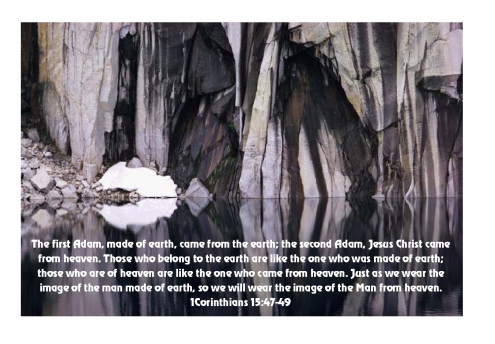 This Jesus is a man from heaven, who held certain beliefs, one of which was that Adam and Eve were literally created on the sixth day (Mark 10:6).
This Jesus is a man from heaven, who held certain beliefs, one of which was that Adam and Eve were literally created on the sixth day (Mark 10:6).
From my rather limited experience of interacting with people who adhere to a modern view, it appears the Jesus presented in the modernist approach is a man of his time, bound by his culture, with a limited understanding of the world He created, and even the fact that He is the Creator is often questioned. I sometimes ask myself whether we are following the same person. I know with absolute certainty that the Jesus I claimed as my guru, before I turned to Him as my Saviour and Lord, was not the same Jesus I follow today, he was a Jesus I had constructed in my own imagination (Mat 7:19-23). Whether others are actually following the biblical Son of God is thankfully not my decision to make. But as we continue to squabble, the chasm between the new theology and a strictly Bible believing approach widens, while the western world drifts away from the teachings of Jesus into humanistic postmodernism and the darkness and hopelessness of atheism.
On the occasions when I have attempted to share with a brother or sister of the modernist persuasion, I find the discussion more often than not centres on deconstructing or demythologising the scriptures, rather than on hearing God’s Word. Some form of literary criticism is brought to the fore and the scriptures are reduced to nothing more than the recorded opinions of selected individuals, concerning the historical figure we know as Jesus. This reduction of the scriptures to just another literary document is often followed by a recounting of various prominent theologians’ perspectives on the text, or personal responses to this “human record” of an experience of the divine. If we cannot even begin by approaching the scriptures as God’s Word, it seems we must shuffle around to find common ground, spending more time and energy discussing our hermeneutics than on sharing God’s glorious truth. Surely this is a major contributing factor in the erosion of the church today.
During the past 40 years, as I encountered more and more Christian communities, I could not help but notice (from the perspective of an outsider), that we have divided ourselves into discrete groups and set up polite barriers.

©Krieg Barrie: Licensed from GoodSalt.com
The modern approach to this problem has been to create councils of churches to try and blend traditions into one amorphous mass. Simplistic as it may sound, I hope and pray that in this age of digital technology, the fragmented church might be prepared to abandon unbiblical rituals and dismantle the traditional walls they have constructed and let God unite us; that we might truly present a unified front to the lost world (John 17:21) as the Body of Christ, sharing the truth of Christ from the Word of God.
8 Who are the saints and apostles?
A group of people are referred to throughout The Bible, who have come to hold a particular status in our popular culture. The Bible often mentions saints and perhaps I should clarify here what I believe the biblical teaching is concerning these people. In the OT saints are the people who give thanks to, and remember the holiness of God (Psalm 30:4). Before the incarnation, saints were the people who made a covenant with God by the prescribed sacrifices. God assured these people they would possess the kingdom. Asaph the seer writes:
Gather my saints together unto me; those that have made a covenant with me by sacrifice. (Psalm 50:5)
While Daniel records:
Until the Ancient of days came, and judgment was given to the saints of the most High; and the time came that the saints possessed the kingdom. (Daniel 7:22)
In the NT the saints are those who are sanctified (made holy) because they are in Christ (the ultimate sacrifice) and call upon His name. As Matthew Henry says, none can be blessed but those that are holy; and all that are holy shall be blessed. Paul clarified just who the saints are when he wrote to the Corinthian church, he said:
To the church of God that is in Corinth, to those sanctified in Christ Jesus, called to be saints together with all those who in every place call upon the name of our Lord Jesus Christ, both their Lord and ours. (1 Corinthians 1:2)
From the preceding verses we find that all believers, that is, all people everywhere whose faith and hope are placed firmly in the finished work of the Lord Jesus Christ; who are born again of the Holy Spirit and are believers in the God of The Bible, are called to be saints. Becoming a saint is a process God has clearly outlined in scripture. It has nothing to do with church tradition and ritual, it is simply by repenting and accepting the gift of salvation, while acknowledging that Jesus Christ is God’s Way of redemption, that a sinner is transformed into a saint. As Peter explains:
He was foreknown before the foundation of the world, but was made manifest in the last times for the sake of you who through Him are believers in God, who raised Him from the dead and gave Him glory, so that your faith and hope are in God. (1 Peter 1:20-21)
The practice of canonisation is not a biblical concept. This human tradition promotes a hierarchical church that is almost the antithesis of the teachings of the Lord Jesus Christ (Matthew 18:3-5; 20:1-16; Luke 9:48; Gal 3:26-28). Those who were given the responsibility to oversee and care for the early church were to be servants to the saints (Matthew 20:27; 23:11; Mark 9:35; 10:44; 1 Cor 9:19), not a separate body of believers. While the role of priest was to become the province of every believer (1 Peter 2:5,9; Rev 1:6; 5:10; 20:6), with the Lord Jesus as the eternal High Priest (Hebrews 2:17; 3:; 4:14,15; 5:10; 6:20; 7:26; 8:1; 9:11; 10:21).
Nor is there any biblical support for the concept of apostolic succession that is claimed by the Roman Catholic Church. The Bible quite clearly teaches that an apostle was one who walked with Jesus during His earthly ministry. When the apostles set about choosing a replacement for Judas, Peter gave clear guidelines on what was necessary for a person to become an apostle, he said:
Now we must choose a replacement for Judas from among these men who have been with us the entire time we were travelling with the Lord Jesus, starting from when He was baptised by John until the day He was taken up from us. From amongst these men one will be chosen and he will join us as a witness of Jesus’ resurrection. (Act 1:21-22)
♥♥♥
9 Jesus’ teachings do not need modernising
Many teachings have come into the church over the years that are not found in the pages of scripture. The NT writers addressed the problem of losing sight of the original, foundational truths when they realised that people were adding to or taking away from the “conclusive” (Jude 1:3), original message that had been entrusted to them. We can only be sure of that message if together we are prepared to accept that God has given us, not only the Living Word to redeem us, but also the written Word to guide us and to be the basis of our understanding of the Christian faith. Anything other than this approach to The Bible smacks of Gnosticism – we would need extra “knowledge” to be welcomed into a community that believes The Bible needs literary criticism and deconstructing to be properly understood.
Bible believing Christians are becoming a rare breed in today’s world. A large section of the church has compromised its position on the inerrancy of The Bible and taken on the world’s ideas concerning reality. As Francis Schaeffer points out in his book The Great Evangelical Disaster, one of the main forces that changed the shape of the church was the Enlightenment. He describes the Enlightenment as:
….. an intellectual movement which emphasized the sufficiency of human reason and skepticism concerning the validity of the traditional authority of the past (3).
He goes on to say:
In the late nineteenth century it was these ideas which began to radically transform Christianity in America. This started especially with the acceptance of the “higher critical” methods that had been developed in Germany. Using these methods, the new liberal theologians completely undercut the authority of Scripture (4).
Since higher criticism invaded the churches and seminaries, many church people have been swayed by humanist ideology, and are blindly prepared to place their faith in secular, humanist philosophy and science. Consequently, the organised church has changed considerably over the past few centuries. It would be reasonable to say that many people who claim to be Christians in the 21st century have beliefs that differ only slightly from those outside the church (see).
The fact that philosophical naturalism/materialism has become the dominant religion of modern society is evident by the total lack of scepticism surrounding the theory of evolution, even amongst those who claim to be followers of Jesus. The true scientific mind relishes investigation and the opportunity to put a theory to the test. This is not the case with the theory of evolution. On many occasions I have found an almost religious fervour surrounding the support of this theory, and this, often, from people who reveal very little understanding of the science behind the theory they insist is the only rational framework for an understanding of the natural world. Many Christians have been swayed by the claims of humanist scientists, who declare there is just one scientific model for the origin of life; but this claim has only come to be accepted because the robust, Bible believing, Christian, scientific alternative has been continuously, militantly and very effectively censored.
In my early teens a neighbour, who was an atheist scientist, convinced me that purely natural processes brought about the universe as we know it. I was swayed by a carefully constructed story, a blend of indisputable facts with speculative fiction, which appeared to explain the material world with no need for the supernatural. However, during the 60s I started to wonder why I should reject the metaphysical without examining it more closely. How could I know there truly was nothing more than the material world if I didn’t properly explore the possibility of a spiritual realm for myself? I decided to put my materialist hypothesis to the test.
The 60s was a unique time in the history of the western world. During this period almost everything was questioned and explored.

We threw away traditional religion and tried eastern mysticism, Celtic metaphysics, psychedelic trips, tarot cards, horoscopes, South American shamanism, alternative healing and western spiritualism. It soon became obvious that there were numerous charlatans waiting to cash in on unsuspecting seekers as they searched for an authentic spiritual reality. People recognised the need for reliable guides or gurus to direct their search and a whole new industry was born, which seems to have morphed into the life coaches of today.
When I eventually turned my attention to the teachings of Jesus they stood out like a beacon. I think for me it was because I genuinely wanted to know whether or not there was a God that He prompted me to stop and listen. I was soon confronted with Oxford don C. S. Lewis’s trilemma. In his book Mere Christianity he writes:
I am trying here to prevent anyone saying the really foolish thing that people often say about Him: “I’m ready to accept Jesus as a great moral teacher, but I don’t accept his claim to be God.” That is the one thing we must not say. A man who was merely a man and said the sort of things Jesus said would not be a great moral teacher. He would either be a lunatic — on the level with the man who says he is a poached egg — or else he would be the Devil of Hell. You must make your choice. Either this man was, and is, the Son of God: or else a madman or something worse. You can shut him up for a fool, you can spit at him and kill him as a demon; or you can fall at his feet and call him Lord and God. But let us not come with any patronising nonsense about his being a great human teacher. He has not left that open to us. He did not intend to.
We are faced, then, with a frightening alternative. This man we are talking about either was (and is) just what He said, or else a lunatic, or something worse. Now it seems to me obvious that He was neither a lunatic nor a fiend: and consequently, however strange or terrifying or unlikely it may seem, I have to accept the view that He was and is God. God has landed on this enemy occupied world in human form (5).
For me there was only one answer to this trilemma, Jesus is who He says He is, and the Risen Christ has continued to prove this to be a fact for the past 40 years of my life. After examining the evidence I discovered the Living Word, and the evidence that the written Word of God can be trusted explicitly is also overwhelming.
It is difficult to understand how people who claim to be followers of Christ can be so strident in their opposition to fellow believers, but tragically, history reveals that this opposition has occasionally become physical. Jesus was only once recorded as raising a hand in violence, and that was against those who sought to gain monetarily by selling hugely overpriced goods in the Temple precinct (John 2:13-16). He formed a whip of cords to drive merchants out of the Temple, but there is no record that He actually struck anyone. Despite His usual physical passivity He did not pull any punches when it came to speaking the truth and His words were enough to attract vitriol and violence. In the end it was simply His ideas that challenged the religious and secular communities of His day and brought about His horrific death.
What we believe about The Bible has an enormous impact on how we live out our faith as Christians. In the 21st century world, the sort of Christianity that views The Bible as more than simply a set of guidelines for religious instruction is becoming more and more politically incorrect; while humanist philosophy and existential thought patterns influence not only cultural norms but also the Christian church. Living our lives as Bible believing Christians in today’s world has become a real challenge; ideas divide the church and inflame the world. As I write this book I am aware that my ideas could possibly enrage some people. Simply stating what we believe can attract violent responses – this must surely be an indication of the desperate state of humanity. One need only watch the evening news to discover that it is not simply the desperately divided church, but patently the whole world is in dire need of the reign and rule of the Prince of Peace.

Footnotes
1 Schaeffer. Francis A. The Great Evangelical Disaster (p. 60). Kindle Edition.
2 Schaeffer. Francis A. The Great Evangelical Disaster (pp. 60-61). Kindle Edition.
3 Schaeffer. Francis A. The Great Evangelical Disaster (Kindle Locations 220-221). Kindle Edition.
4 Ibid (Kindle Locations 228-229)
5 Lewis, C.S., Mere Christianity, Great Britain: Collins Fontana, 1971, p52-53.























